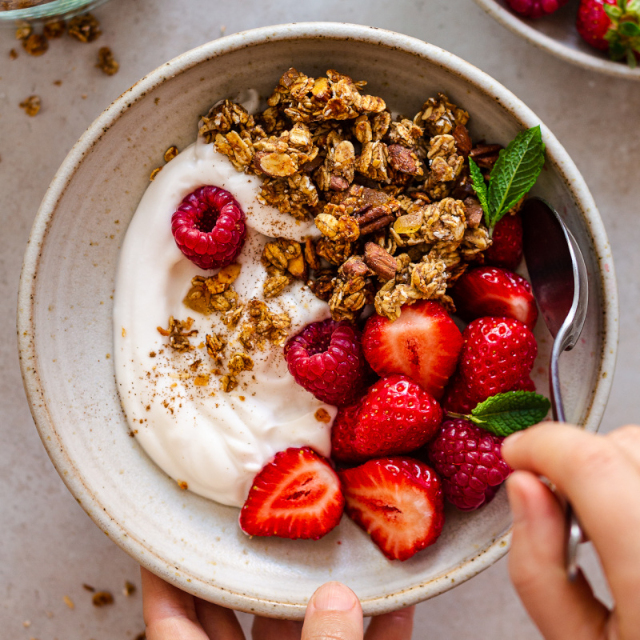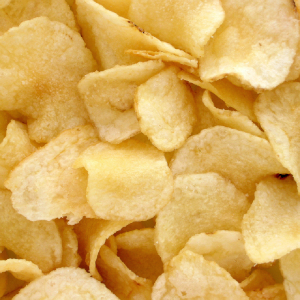Call it ‘The Best of the Worst, and the Worst of the Best’. If you want to get sensational about it. But I’ve recently been showered with posts that claim foods thought of as ‘bad’ are really good for you. And vice-versa!
 Granola: The ultimate ‘healthy’ treat? One cup delivers up to 2,400 Calories, mainly in
Granola: The ultimate ‘healthy’ treat? One cup delivers up to 2,400 Calories, mainly in
carbs and sugar. Commercially made flavoured yogurt is packed with sugar…
Sister Erin has become my official Research Assistant. She boots me out of my desk at 1 pm sharp every day and scours the Internet for stories she thinks will make good posts for this blog. And stuff she just thinks will amaze or amuse me. The subject matter yesterday ranged from Grizzly bears to Donald Trump. She says there’s a resemblance. Anyway, she also delivered an unexpected dump of the above-mentioned contrarian posts…
The premise
The underlying premise of these seemingly ‘renegade’ posts is that foods that are condemned by dieticians and nutritionists are really good for you. And Others that are lionized by the ‘experts’ are really not so healthy.
We present, forthwith, a sampling of the worst of the good and the best of the bad, as portrayed in the posts in question…
The good bad ones
White Bread
No. Really. Nutritionists say your basic supermarket white sliced loaf is high in empty Calories (carbs) and low in many other nutrients. They also class white bread as among the most ‘ultra-processed’ foods on the market.
But supporters are quick to point out that white bread naturally provides 17 percent of your official daily requirement of calcium. And it’s artificially rich on other vitamins and minerals, because government all over the developed world have mandated that bread flour be ‘fortified’.
My note: You can’t just dismiss the fact that white bread is highly processed. And there’s just something wrong – unnatural in many ways – about a food you have to add back all the key nutrients to so it will have some redeeming dietary value.
Potato Chips
A standard 25 g bag of potato chips reportedly delivers, “more potassium than the average banana and more vitamin C than a small bunch of red grapes.” They are a deep-fried delicacy, for sure, but proponents of the ‘crisp’ – as the Brits call it – claim, “most chips are also fried in sunflower or rapeseed oil, high in unsaturated fat, so won’t raise your blood cholesterol.”
My note: Alert the Misconception Squad! Recent science has shown that dietary cholesterol intake does not correlate directly to blood cholesterol levels. So that’s not an issue, here. What is an issue is the amount of total fat deep-fried foods carry. And, by the way… There are better ways to get your calcium and vitamin C.
Holiday Fruit Cake
You either love it or hate it. There’s no middle ground. Apologists stress it does contain enough dried fruit to constitute at least one official serving of fruit as recommended under the national dining guides. And it delivers 10 percent of your daily requirement of iron per slice.
My note: Whether you consider it a ‘doorstop’ or ‘gob-stopper’, Fruit Cake is full of concentrated, classic festive dietary sins including sugar, fat and carbs (Calories). It’s clear to me that, as much fruit as it contains, Fruit Cake’s negatives outweigh its positives.
The bad good ones
Granola
It’s been considered a ‘health’ food since the terms was coined, back in the 1960s. And it’s full of good things, for sure. One big ‘pro’ in its favour is all the whole grains, nuts and seeds in the mix. It’s still considered the top choice for hikers and other high-activity types. And you can’t overlook the sugar-driven energy hit it delivers.
But nutritionists say most folks eat too much of it. A tiny, 1/4 cup serving can run as high as 600 calories – more than a quarter of your daily recommended allotment. Most folks eat 3 to 4 times that for breakfast. And even more than that when snacking.
My note: For the average person, granola is a recipe for sugar overload and carbs overload!
Flavoured Yogurt
Yogurt is indisputably good for you. It’s a fermented food, and that alone is a positive. It’s also chock-full of vitamins and minerals and calcium. Who could argue with that?
Professional nutritionists, that’s who. They point out that commercial, packaged flavoured yogurts are usually, “packed with so much sugar they may as well be dessert,” says Robin Foroutan, RD.
My note: Talk about hidden perils! Foroutan suggests – and I agree – that you should stick with plain yogurts and ad your own flavourings.
Diet Soda
Sounds like the ideal way to address your excess sugar intake. ‘Zero Calories’ and zero added sugar! Just water, flavouring and a little artificial sweetener. But..
“Zero calories doesn’t mean zero impact on your body,” says Christy Brissette, RD., President of 80 Twenty Nutrition.Some artificial sweeteners are suspected of causing cancer and other diseases. And certain sweeteners are suspected of stimulating hunger, leading to over-eating.
My note: Another dietary ‘wolf in sheep’s clothing’? Recent science has shown that you’d have to consume immense amounts of the alleged ‘dangerous’ sweeteners before risking ill effects. In their experiments, previous researchers fed mice ‘doses’ of the substances bigger than many cans of diet soda would deliver…
My take
There are two sides to every dietary story. That’s certainly true of the foods we’ve spotlighted today.
And there are no ‘good’ or ‘bad’ foods – just good or bad diets.
~ Maggie J.

